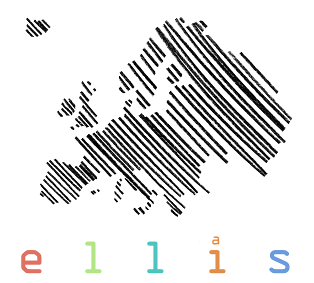The QPhML Program
Increased computational power and data availability, as well as algorithmic advances, have led to impressive machine learning applications in many areas such as computer vision, pattern recognition, robotics and AI. At the same time, conventional CMOS technology is reaching its physical limits and the energy consumption of computing is reaching alarming proportions. There is therefore a great need to design novel computing paradigms that face these challenges.
The aim of the Ellis program Quantum and Physics based machine learning (QPhML) is to use concepts from quantum physics and statistical physics to develop novel machine learning algorithms with the ultimate aim to realize novel future, possibly energy efficient, hardware implementations.
The program is part of the recent European initiative called ELLIS (European Laboratory for Learning and Intelligent Systems) to stimulate research on machine learning by building networks of top reseach groups in Europe.
The program focuses on the following directions:
Quantum enhanced machine learning
Quantum devices are nearing the noisy intermediate scale quantum (NISQ) era, corresponding to machines with 50 to 100 qubits and capable of executing circuits with depths on the order of thousands of elementary two qubit operations. NISQ devices may provide computational advantages over classical supercomputers for various machine learning problems, which includes sampling from hard-to-simulate probability distributions for Bayesian methods and the Quantum Boltzmann Machine and linear algebra problems (for instance for kernel methods or deep learning). It is hoped that the application of NISQ technology to machine learning may be one of the first instances exhibiting genuine quantum advantages.
Statistical physics approach to machine learning
Noise plays a fundamental role for learning in large neural networks. Rather than designing reliable bits and use software to generate random numbers, an appealing alternative is to design hardware that is noisy by design. Such devices would be much more energy efficient. Methods from non-equilibrium statistical physics are well suited to improve our understanding of stochastic systems. An example is the use of physically coupled replicas that have been shown to be very effective for hard combinatoric or strongly non-linear learning problems. In addition, the observation that physical replicas resemble Trotterized quantum systems provides a promising new research direction for the design of stochastic or quantum learning algorithms. Another link between quantum and stochastic systems is the observation that sign free quantum systems can be mapped onto classical stochastic diffusion problems.
Using machine learning for quantum physics
The challenge of quantum many-body physics is to efficiently describe and control exponential numbers of parameters of quantum systems. Better characterization of such systems will lead to the understanding of quantum materials such as high-temperature superconductors or topological insulators. Enhanced control of immense parameter spaces will improve the understanding and design of quantum devices, enabling quantum computers and networks. For this problem, machine learning offers a new option.
Fellows
The Ellis program is realized through the active involvement of the Ellis Fellows (senior researchers) and Ellis Scholars (more junior researchers). In addition, the Ellis Guests, are affiliated researchers.
Ellis Fellows
Bert Kappen (program director) Department of Biophysics, Radboud University (Nijmegen). [web]
Riccardo Zecchina (program director) Department of Decision Sciences, Bocconi University (Milan). [web]
Miguel Angel Delgado Department of Theoretical Physics, Universidad Complutense (Madrid). [web]
David Gross Institute for Theoretical Physics, University of Cologne (Cologne). [web]
Florian Marquardt Institute for Theoretical physics, Max Planck Institute (Erlangen). [web]
Matthias Rupp Department of Theory, Fritz-Haber-Institut of the Max Planck Society (Berlin). [web]
Gabor Csanyi Department of Engineering, University of Cambridge (Cambridge). [web]
Florent Krzakala Department of Physics, Ecole Normal Superieur (Paris). [web]
Giulio Biroli Department of Physics, Ecole Normal Superieur (Paris). [web]
Lenka Zdeborova Institute for theoretical physics, University Paris-Saclay (Paris). [web]
Jens Eisert Dahlem Center for Complex Quantum Systems Free University Berlin (Berlin). [web]
Giuseppe Santoro SISSA (Trieste). [web]
Remi Monasson Department of Physics, Ecole Normal Superieur (Paris). [web]
Ellis Scholars
Carlo Baldassi Department of Decision Sciences, Bocconi University (Milan). [web]
Vedran Dunjko Leiden Institute for Advanced Computer Science, University Leiden (Leiden). [web]
Giuseppe Carleo Center for Computational Quantum Physics, Flatiron Institute (New York). [web]
Ellis Guests
Marc Mezard Department of Physics, Ecole Normal Superieur (Paris). [web]
Nicolas Regnault Department of Physics, Ecole Normal Superieur (Paris). [web]
Jorge Kurchan Department of Physics, Ecole Normal Superieur (Paris). [web]
Matthias Troyer ETH Zurich and Microsoft Research. [web]
Manfred Opper TU (Berlin). [web]
Hans Briegel Institut für Theoretische Physik, University of Innsbrück (Innsbrück). [web]
Aram Harrow MIT (Boston). [web]
Valentina Ros Department of Physics, Ecole Normal Superieur (Paris). [web]
Andrea Rocchetto Department of Computer Science, University of Texas at Austin, (Austin). [web]
Frank Noe AI4Science, Freie Universitaet (Berlin). [web]
Events
Ellis QPhML 2019 workshop. The DALI conference. San Sebastian, 5 September 2019
Ellis QPhML 2020 workshop. Virtual. Milan - Tübingen - Nijmegen, 6-8 July 2020
Ellis QPhML - ESA Phi Lab 2021 workshop. Virtual. 27 May 2021
Ellis QPhML - Frontiers of Neuromorphic Computing. Max Planck Institute for the Science of Light, Erlangen. 5-7 September 2023
